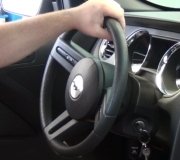Actually, squealing is more common with higher-quality brake pads because they're made from harder material. One of the biggest things to reduce their tendency to squeal is to bevel the edges of the linings to remove the "fingernails-on-the-blackboard" effect if that wasn't already done by the manufacturer. I've found that very little material needs to be removed. Simply dragging them on a concrete floor a little is enough to prevent a squeal during the break-in period, and that seems to be sufficient. You can use a flat file too. Four or five passes is enough.
The linings could be glazed to. That often occurs when the linings aren't broken in properly. It is customary for the mechanic to perform a half dozen fairly hard stops during the test drive with a minute or two of cooling in between. If that is not done, the break-in is up to you but the need for this should be explained when you pick up the vehicle. New linings never make perfect 100 percent contact with new or machined used rotors. That means you have to push harder on the brake pedal to stop, and that causes the linings to heat up too much, and the binders, (glue) softens and causes the glazing. In severe cases you'll lose the brakes completely from one form of brake fade. Simply allowing them to cool down for an hour will restore proper operation, but that glazing can remain.
A simple way to remove that glazing is to have the rotors machined lightly to roughen them up. That will grind off the glazed material from the linings. The leading edges of the linings should be ground off at the same time as I mention at first. Once that is done, the same break-in procedure needs to be done. Brake fade can occur if you immediately do a lot of city stop-and-go driving. The brakes should be used normally with a few harder-than-normal stops for the first 100 miles.
It is also important to lubricate the back of the pads where they contact the calipers and pistons, and where the calipers rest on their mounts. Pads are going to vibrate, which causes the squealing, but the grease encourages free movement between parts which reduces the vibration being transmitted between them and amplified. All of the pad contact points need to have a flat file run across them a few times to remove any dirt that would prevent the pads' backing plates from sitting squarely against the caliper fingers and pistons.
All of these things are usually overlooked by do-it-yourselfers who typically just slap in a new set of pads. When they get lucky and have no noises or pedal pulsations, that's dandy, but when we're asked to solve these things, those are the things we look for. The brake grease is a special high-temperature brake grease designed for this purpose. It will not migrate onto and contaminate the friction surfaces, and it won't melt from the high heat of braking.
Those are things a professional does to PREVENT noises. A mechanic can also CAUSE squealing by getting grease on the rotors or pad friction surfaces. Nothing bad will happen if any contamination is washed off before the pads go through a warm-up cycle, but once they get hot, the grease will soak in and never come out. They'll have to be replaced to solve that. Most of us even wash our hands when assembling pads and rotors so we don't get fingerprint grease on the friction surfaces.
In some cases weak anti-rattle hardware can allow pads to move around too much. That is a less-common cause of noises but it can be suspected when all of the other causes have been eliminated.
SPONSORED LINKS
Monday, December 22nd, 2014 AT 7:38 PM



